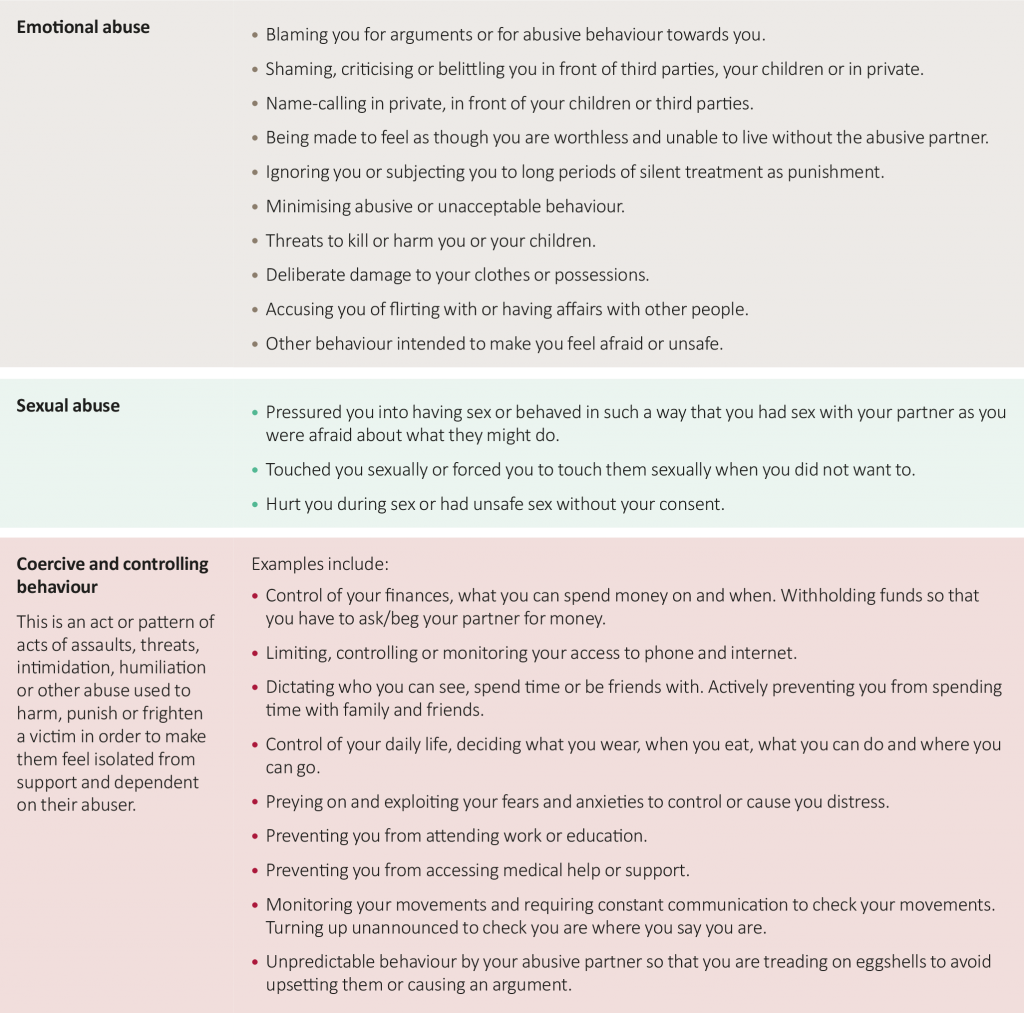What do I do if I have been in an abusive relationship?
What is domestic abuse?
The government definition of domestic abuse is “any incident or pattern of incidents of controlling, coercive, threatening behaviour, violence or abuse between those aged 16 or over who are, or have been, intimate partners or family members regardless of gender or sexuality. The abuse can include, but is not limited to: psychological, physical, sexual, financial and emotional.”
Domestic abuse does not discriminate; it can affect anyone of any age, gender, sexuality, socio-economic status or ethnicity. It is important to remember that domestic abuse is not limited to physical violence and that it is often difficult for both victims and third parties to recognise the signs.
Examples of non-violent abusive behaviour include (but are not limited to) the following:

Why is it so important to get help?
Domestic abuse is a crime and you should not feel that you have to put up with or cope with abusive behaviour.
The first priority in any situation where abuse is a factor is the safety of you and of any children. Abusive behaviour has serious short and long-term impacts on the physical, mental, emotional and psychological health of victims. It is now understood that, even where children are not directly on the receiving end of domestic abuse, they can suffer significant harm through exposure to and living with domestic abuse in their home. This harm can manifest itself in emotional, behavioural and psychological issues in children both now and in the future.
What should I do?
In an emergency situation where you and/or the children are in danger or any threat of danger the first step should always be to contact the Police on 999. Otherwise help can be sought through professionals such as your GP, other medical professional or a teacher at your child’s school who can make referrals to social services. Alternatively there are a number of specialist domestic abuse organisations offering help, support and information. These include:
| National Domestic Abuse helpline (for women, a partnership between Women’s Aid and Refuge) | 0808 2000 247 (24hr free helpline) |
| Women’s Aid | https://www.womensaid.org.uk/ |
| Refuge | https://www.refuge.org.uk/ |
| Men’s Advice Line | 0808 801 0327 and https://mensadviceline.org.uk/ |
| Galop (National LGBTQ+ helpline) | 0800 999 5428 |
| Hestia – support and information for anyone in an abusive relationship | Bright Sky – Free mobile app |
| Childline (for children and young people) | 0800 111 and https://www.childline.org.uk/ |
| Relate (relationship support) | 0300 003 0396 |
You could also consider taking specialist legal advice from a family lawyer to assist you in making appropriate legal arrangements to protect you and your children. Depending on your financial circumstances, if you are a victim of domestic abuse, you may be able to secure Legal Aid funding for your legal fees in court cases about your children.
What does this mean for any time my children spend with the other parent?
Where there are allegations of domestic abuse against one parent it may be appropriate for safeguards to be put in place before a child spends time with that parent. It may be that it is not suitable for a child to spend time with the abusive parent or that their time together is supported by a third party or supervised by a professional. If Social Services have been involved they may speak to both parents and give their views about contact arrangements. In other cases, if you have concerns about the safety of the children spending time with the other parent or about coming into contact with that parent, you should seek legal advice to put appropriate legal safeguards in place.